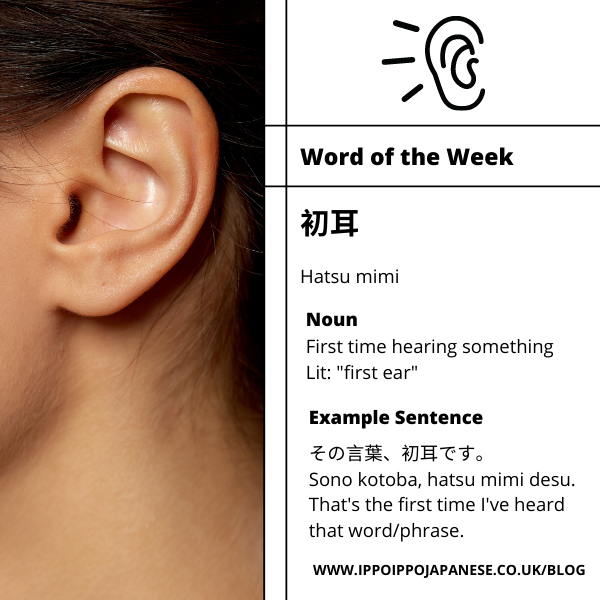Posted: 27th October 2022
Hello and welcome to the Ippo Ippo Japanese Word of the Week!
This Week's Word Is...
初耳
- In hiragana: はつみみ
- In rōmaji: hatsu mimi
Before We Begin
None of the links in this post are affiliated, which means I don't make money via companies like Amazon when you click on them. If you'd like to support the blog with a donation (however small!), you can do so via Ko-fi.
What Does 初耳 (hatsu mimi) Mean?
First of all, let's look at the kanji used in this word:
- 初 (hatsu) - first
- 耳 (mimi) - ear
So... "First ear?"
The reason I like this word so much is that it takes something very literal sounding and gives it a new spin.
The meaning of 初耳 (hatsu mimi) is in fact "hearing something for the first time" - or as I like to imagine it, "the first time a word/story/piece of news reaches your ears".
Quick side note: another handy word that starts with 初 (hatsu) is 初恋 (hatsu koi): first love!
How to Use 初耳 (hatsu mimi)
初耳 (hatsu mimi) is an extremely handy phrase if you're spending a lot of time learning a new language - specifically, the Japanese language! As soon as I learnt this word, I couldn't get enough of how useful it was both in and outside of my Japanese lessons.
A good starter example of how to use 初耳 (hatsu mimi) would be:
- その言葉、初耳です (Sono kotoba, hatsu mimi desu / That's the first time I've heard that word/phrase*)
Or if you're looking for something nice and multipurpose:
- 初耳です (Hatsu mimi desu / That's the first time I've heard it)
While so far we've focused on using 初耳 (hatsu mimi) to describe a word/phrase you're hearing for the first time, it is in fact far more flexible and applicable to all sorts of scenarios.
For example, the phrase we've just seen above could also be used to express surprise at some news that has somehow passed you by. If you want to expand on this phrasing a little further, you could also say:
- その話は初耳です (Sono hanashi wa hatsu mimi desu / This is the first I'm hearing of it)
Personally, this (or a close variant of it) is something I've used in a whole load of situations, from chatting with friends to navigating tense conversations in the workplace!
Before we move on to this week's bonus language note, here's an example of how a conversation using 初耳 (hatsu mimi) can go down between friends:
- A: あの人結婚してたの? (Ano hito kekkon shiteta no? / That person was married?)
- B: 知らなかったの?(Shiranakatta no? / Didn't you know?)
- A: 初耳だよ (Hatsu mimi da yo / It's the first I'm hearing of it)
Bonus Note: 初耳 (hatsu mimi) and なんて (nante)
In one of the phrases quoted above, you might have spotted the word なんて (nante). This is a fairly common bedfellow of 初耳 (hatsu mimi), and is a great way of expressing surprise, though be warned: this grammar is a little more on the advanced side of things, being listed as N3 level by sources such as JLPT Sensei.
Here's an example sentence using 初耳 (hatsu mimi) and なんて (nante):
- 福田さんが東京に引っ越すなんて初耳ですよ (Fukuda-san ga Tōkyō ni hikkosu nante hatsu mimi desu yo / This is the first I'm hearing of Fukuda moving to Tokyo)
While the なんて (nante) part of this sentence doesn't translate particularly well into English, in this context it's essentially an empathic expression that highlights the speaker's surprise. Other emotions it can be used to highlight include disgust, admiration, happiness and disbelief, making it a fantastic way of expressing strong emotions in Japanese!
If you'd like more examples of なんて (nante), I recommend clicking here for Maggie Sensei's comprehensive guide.
Sources & More Info
- HiNative: 「初耳」を含む文の意味
- Maggie Sensei: How to use なんて ( = nante)
You've reached the end of this post! I hope you enjoyed it.
For updates on posts like this sent straight to your inbox, sign up to my newsletter (sent no more than once a month):

Support Me on Ko-fi
If you've enjoyed this post and would like to see more like it in future, please consider sending a donation - however small! - via Ko-fi. I don't include any affiliated links or ads on my blog, so every little helps!
Please donate via the portal below or by going directly to the Ippo Ippo Japanese Ko-fi page.







